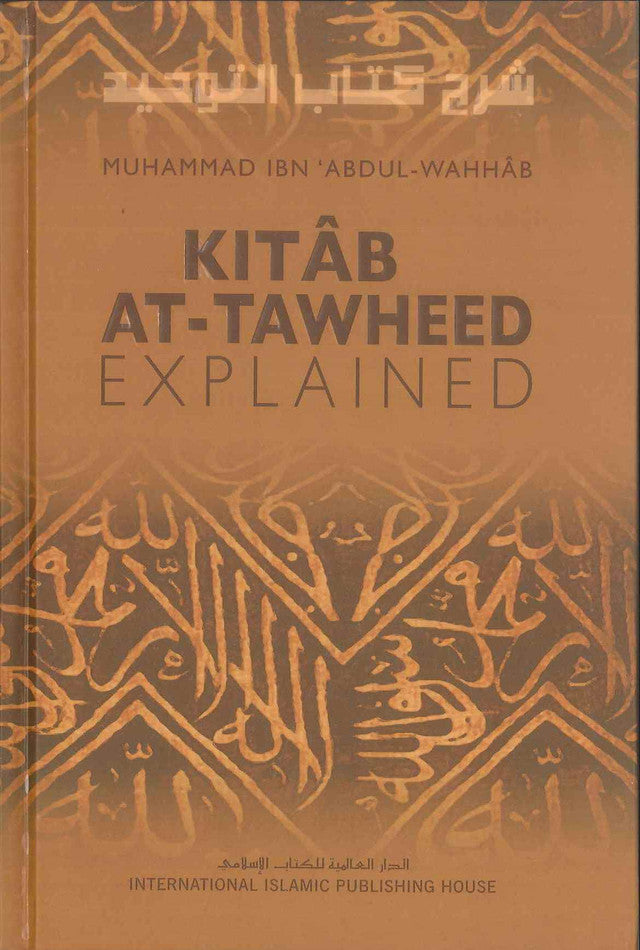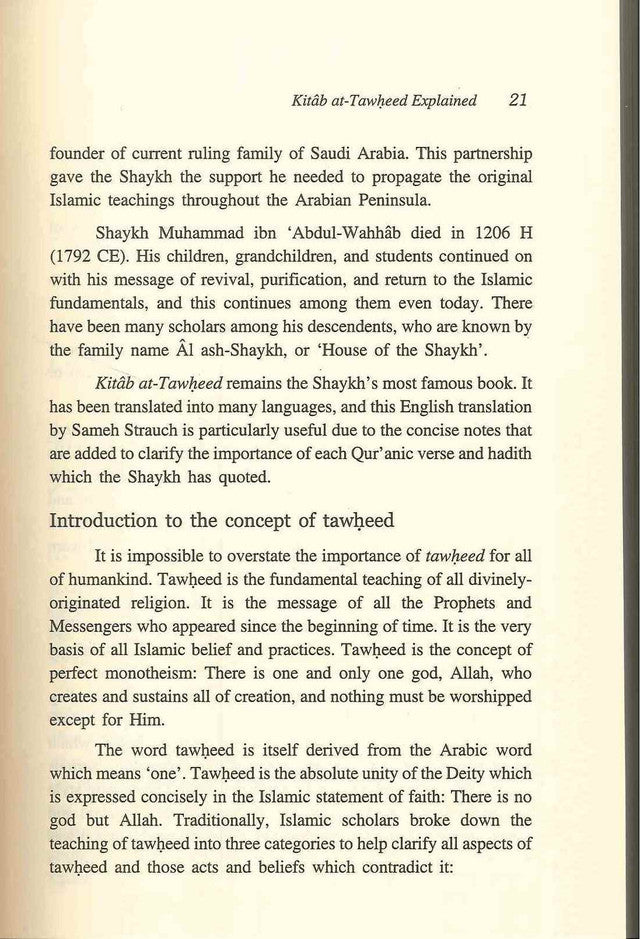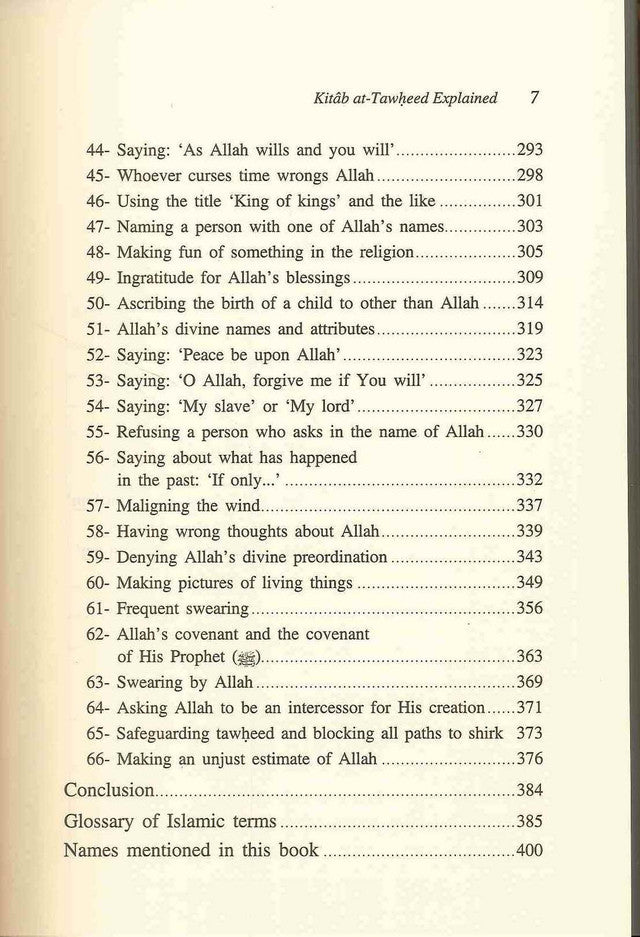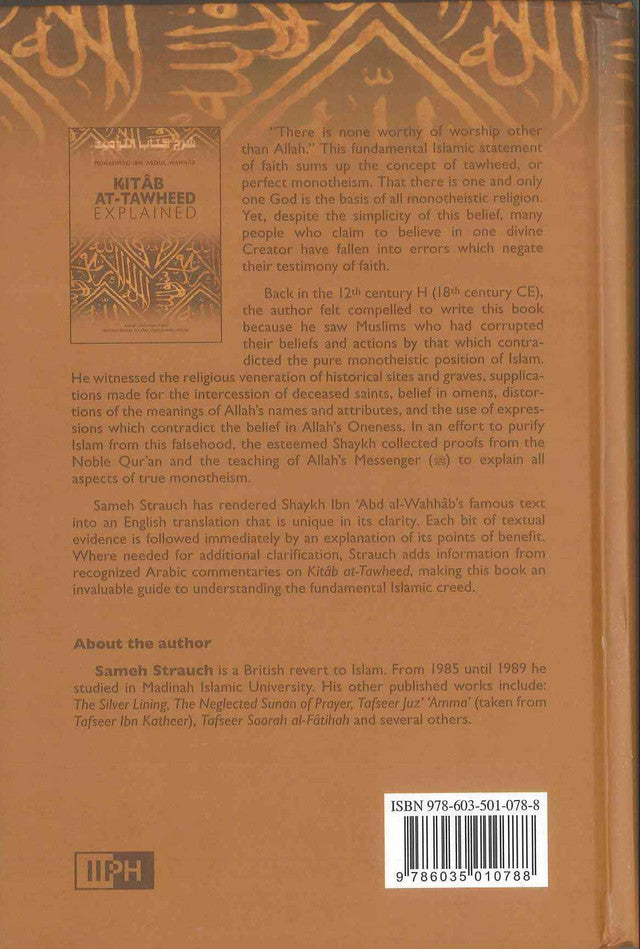Kitab At Tawheed Explained
Kitab At Tawheed Explained
Publisher:
IIPH (International Islamic Publishing House)
Language:
English
Binding:
Hard Cover
Pages: 399
Size: 15x22cm
Couldn't load pickup availability




Collapsible content
Description of Book
Kitab At Tawheed Explained
Publisher
IIPH (International Islamic Publishing House)
Author
Sample Pages - Content
PAGE NO :1
MUHAMMAD IBN 'ABDUL-WAHHÄB
KITAB
AT-TAWHEED
iNTERNATf0NAl. ISLAMIC PU8LlSHlNG HOUSE
PAGE NO :2
List of Contents
Publisher's Note
Translator's Foreword
Author's Foreword
Preface — Dr. 'Adnän Zarzoor
CHAPTER ONE
The Unique Characteristics of Our Civilization
CHAPTER TWO
The Impact of Our Civilization
CHAPTER THREE
Our Humane Tendency
CHAPTER FOUR
Racial Equality
CHAPTER FIVE
Religious Tolerance
CHAPTER SIX
Our Etiquette in War
CHAPTER SEVEN
Kindness to Animals
PAGE NO :3
CHAPTER ONE
The Unique Characteristics
of Our Civilization
Some of those who have written about the history of
civilization define civilization as "a social system which helps
man to increase his cultural output. " Civilization consists of four
main elements: economical resources, political systems, moral
and science and arts. The development and progress ofa
civilization requires many factors such as geographical and
economic factors, and psychological factors such as religion,
language and education. The collapse of a civilization stems from
factors which are the opposite of those which lead to its rise and
development; the most important of these destructive factors
include moral and intellectual decadence, lawlessness and
breakdown of social systems, the spread Of oppression and
poverty, the spread of pessimism and apathy and the lack of
competent and sincere leaders. The story of civilization began
when man first appeared, and it is a long chain which one civilized
nation passes on to those who come aner it. Civilization is not
unique to any one land or race, rather it stems from the factors we
have mentioned above. There is hardly any nation that has not
written some of the pages of the history of civilization, but the
thing that distinguishes one civilization from another is the
strength ofthe foundation on which it is built, the great influence
that it may have, and the benefits that hitman;ty may enjoy as a
result of its rise. The more universal a civilization is in its
message, the more humane it is in its inclination, the more moral it
PAGE NO :4
Civilization of Faith 63
masses from the oppression of kings, nobles, powerful men and
the clergy; in reforming the relationship between rulers and
subjects; in guiding people to Allah Alone, Who is the Creator of
the universe and the Lord of the worlds. This belief also had a
great effect on Islamic civilization which is virtually unique
among all civilizations before or since in that it is free from all
forms of idolatry and of idolatrous literature and philosophy in its
beliefs, rule, art, poetry and literature. This is the reason why
Islamic civilization refrained from translating the Iliad and the
best of idolatrous Greek literature. It is also the reason why
Islamic civilization fell short in some of the arts of sculpture and
image-making, despite its prominence in the arts of inscription,
engraving and architectural adomment. Islam, which declared war
on idolau•y and its manifestations, did not permit any expressions
or relics of idolatry from ancient times to exist in its civilization,
such as statues of great men. righteous men, Prophets or
conquerors. Statues are one of the most prominent features of
ancient and modern civilizations, because none of them took
belief in oneness to the extent that Islamic civilization did.
This belief in oneness has an impact on all the foundations
and systems produced by our civilization. So there is unity in its
message, unity in its legislation, unity in its general aims, unity in
humanity in general, unity in the way of life and pattern of
thinking. Researchers studying the Islamic arts have noticed a
unity of style and taste in different kinds of an, so that a piece of
Andalusian ivory, a piece of Egyptian textile, a piece of Syrian
potter,' and a piece of Iranian metalwork, despite the differences
in their forms and ornamentation, all have the same style and
character.
2. The second of the characteristics of our civilization is that it is
human in its inclinations and objectives, universal in its ambition
PAGE NO :5
CIVILIZATION
OF FAITH
We are living at a time when western
civilization is at its peak and [lie Muslim
nations are at their weakest point, dazzled by
the power Of the west with its wealth, means
and scientific and technological advantages.
Muslims who do not read history. may well be
unaware of the fact that this has not always
been the case, A few hundred years ago.
was just the opposite, The Muslim ummah
was the superpower the age and the
Muslims were lhe leaders in culture, science
and technology. The cities of the Muslim world were centers of
learning to which people came from far and wide, including — as in the
casc of Muslim Spain — the lands of Christian Europe.
The Muslims, at one time, were the most technologically advanced
civilization on earth, and the uniqueness of their civilization lies in the
fact that-although they achieved a great deal in materialistic terms,
they remained compassionate society where the poor and
disadvantaged were for,
This book is a reminder to Muslims that they have a glorious past and
that for many centuries they had the upper hand over other nations.
They became masters of the world at thc lime when they adhered to
Islam. When they became preoccupied with worldly gain and the
pursuit of luxury, then decline set in.
If the Muslims adhere to Islam and take their religion faithfully, they
will, once again, be supported by thc Will of Allah and will again be
able to lead the world in all spheues of' life.
Muhammad ibn Abdul- Wahhab
Muhammad ibn Abdul-Wahhab (1703–1792) was a prominent Islamic scholar and reformer from the Najd region of Arabia. He is best known for his efforts to purify Islamic practices by returning to the fundamentals of tawheed (monotheism) as taught in the Qur'an and Sunnah.




